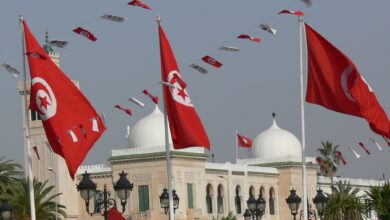On 25 January 1952, Brigadier Exham–head of a British military operation in Ismailia–called Egyptian Communication Lieutenant Sherif al-Adad to tell him to evacuate the headquarters of the governorate and police stations on the grounds they had become safe havens for fighters against British occupation forces. Fouad Serag al-Din, minister of interior at the time, refused to accept the warning and ordered police forces to defend the building in the event of a British attack.
This irked Exham, leading him to rally seven thousands soldiers, armed with tanks and field cannons, and lay siege to the targeted buildings. Without hesitation, the brigadier ordered his men to fire when the police officers refused to give up their weapons and evacuate the building. The heroic police officers had nothing but small arms and were fully aware that armed confrontation would be deadly. Despite this, they preferred to die rather than surrender. They remained steadfast until the last standing officer, thereby marking 25 January as a day to celebrate the heroism of Egypt’s police.
Today, 59 years later, the situation is drastically different. Egypt is no longer occupied by British troops. Nevertheless, Egypt has lost its political independence, having become all but an American protectorate. Egypt is ruled by a corrupt and authoritarian regime whose policies serve a narrow segment of the population and harm the interests of the majority. The regime relies on the security apparatus to rule the country. It disregards the law and employs torture, sometimes with fatal consequences. Not only does the regime insist on keeping its grip on power, it also seeks to move forward with a plan for hereditary succession of the presidency.
It's no surprise that some political activists have chosen this occasion to call on the Egyptian public to take to the streets and demand the regime provide jobs for the unemployed, improve living standards for the poor and marginalized, and stop the systematic torture of protesters and members of the opposition. I believe the 6 April Youth movement, the primary force behind this mobilization, has rightly picked this politically significant day for a nation-wide protest.
A new spirit has taken hold among political elites in several Arab countries, including Egypt, after the Tunisian people’s successful overthrow of one of the most entrenched authoritarian regimes in the region. Notwithstanding the ongoing debate about the viability of the Tunisian experience for other Arab countries, an increasing number of Arab political elites have become convinced that street mobilization is the most effective way to pressure existing regimes and achieve desired political results.
The Tunisian experience offers a particularly important lesson in this regard. The Tunisian elite did not drive the public to revolt. Instead, it was the Tunisian people that mobilized spontaneously and prompted the elites to take part in this historic event.
The next few weeks will show whether the primary obstacle to the spread of a Tunisian-style uprising to other Arab countries, especially ones facing similar political and socio-economic challenges, stems from the weakness of political elites or the fact that other Arab people fear taking to the streets to demand their political rights.
Translated from the Arabic Edition.




